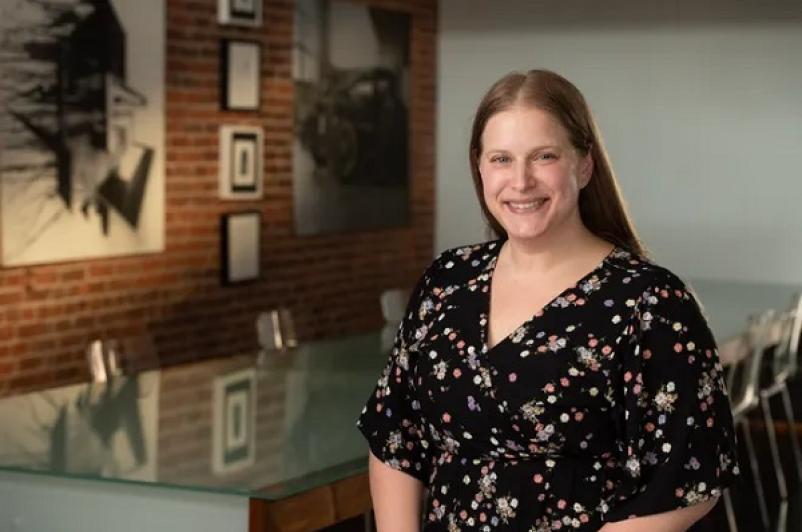
When Jen Musok, a UHS patient, learned her sister completed a DNA kit, she had no idea that the genetic test could save her life. It revealed they were carrying the BRCA1 mutation and, after further testing, Musok discovered that she had an 87% chance of getting breast cancer and a 64% chance of getting ovarian cancer.
“I found out strangely,” she says. “My sister got a DNA kit from her mother-in-law for her birthday and did the genetic testing component. She tested positive and did more advanced tests because there were more markers to confirm that positive. And she was confirmed positive. So, I also tested and found out I was positive.”
As a wife, mother, daughter and sister, no decision was necessary. Ms. Musok knew she was going to have all of the preventive surgeries.
“Even with the surveillance of being proactive, I didn't want to sit and wait thinking: ‘Is this the day that they're going to find something?’ I'm going to have to have the surgeries anyway, plus potentially chemotherapy or radiation,” she says. “It was a quick decision; my percentages of getting cancer were so high. Those numbers were scary.”
Experienced in empathy and care
As if it weren’t already an unsettling time with this news, Ms. Musok would be moving forward with her preventive procedures amid the COVID-19 pandemic. She had a salpingo-oophorectomy to remove the fallopian tubes and both ovaries in January 2020. “We started with that surgery first because ovarian cancer is harder to detect, even with the monitoring,” she says.
Ms. Musok recalls after one of her surgeries: “I was able to wake up in my room with my husband because there was no waiting room back then; he was allowed to just wait in my room.”
The empathy and support she received from UHS throughout the process is something she won’t forget. She had many questions about her procedures and says the UHS teams were always welcoming when she had a question, whether over the phone or in the operating room.
“It was COVID. I was scared. I remember being in the operating area, getting anxious and crying. They came and held my hands and told me: ‘It's going to be okay.’”
A personal decision
For Ms. Musok, the choice for preventive surgeries couldn’t be clearer. But that’s not the case for everyone. She recommends that others in her situation talk to their providers to understand what their surveillance entails.
“It's a personal choice, and some people opt for surveillance. They don't want to go through all this. It wasn't a guarantee that I was not going to get cancer. I didn't want to think about it; I wanted to do this and move on,” she says.
Understand your healthcare team’s surveillance practices, she advises. Because her father had pancreatic cancer, she still undergoes surveillance as an additional precaution.
Despite Ms. Musok's challenges, she would gladly go through the process again. In fact, she was ultimately able to reduce her risk by over 90%.
“I will be here for my son,” she says. “That was my ‘why,’ and that didn't change throughout all of it. I always did it for my family.”
Proactive strategies for healing
Jen Musok, a UHS patient, knew being proactive was the best thing she could do for her family when she learned she had the BRCA1 gene and an 87% chance of developing cancer. She was also aware that her decisions would affect her family as much as her. She shares the following advice to help manage throughout the healing process.
1. Research. “Ask your healthcare team every question,” she advises. “There is no such thing as a silly question. My providers knew that I’d come with a list of questions when I had an appointment. I wanted to know what to expect for every surgery.”
2. Involve your kids. “My son was so little when it started. I found a book titled ‘Why is Mommy Having Surgery?’ It was a tool that we would read to him over and over. It was so helpful.” The book helped him process what his mother was going through and encouraged him to help, bringing Ms. Musok glasses of water when she needed it. Her friends even commented on how the experience brought out her son’s compassion and understanding.
3. Ask for help. “I'm married, but I consider myself to be independent. But I needed to lean on others in a way I never needed before,” she says. “Don't be afraid to ask for help. You’re going to need it.”
Ms. Musok says she found herself in situations she didn’t imagine, such as needing assistance brushing her hair, showering and more.
She says, “It humbled me to need help, but I was fortunate to have it. It's not a shameful thing to ask for. It's a positive thing.”
To learn more about how cancer prevention and treatment options at UHS are helping patients, visit nyuhs.org.


